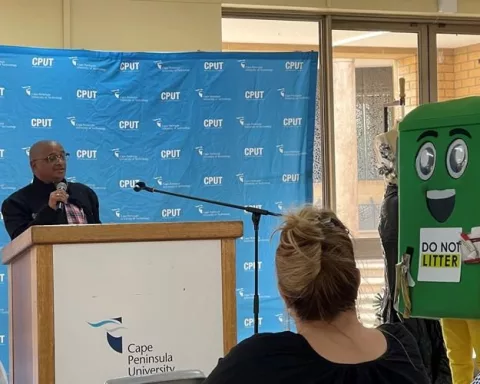The National Joint Operational and Intelligence Structure Coordination Centre (NCC) has launched in South Africa, representing the country’s unwavering dedication to national security. The centre is equipped with cutting-edge technology capable of real-time monitoring and response to unfolding scenarios and shares a dynamic and interconnected relationship with the Provincial Joint structures across all nine provinces. The NCC is not merely a technological hub but also a meeting ground for intellects, housing representatives from 39 government departments, agencies, state-owned corporations, and private sector stakeholders. It promises a safer environment for the country’s residents, and its long-term vision is to maintain its round-the-clock surveillance and coordination role.
The Launch of the National Joint Operational and Intelligence Structure Coordination Centre
What is the National Joint Operational and Intelligence Structure Coordination Centre (NCC) and why is it significant?
The NCC is a crucial hub for national security management in South Africa, equipped with cutting-edge technology capable of real-time monitoring and response to unfolding scenarios. It shares a dynamic and interconnected relationship with the Provincial Joint structures across all nine provinces, and is a collaborative meeting ground for intellects. The NCC’s long-term vision is to maintain its round-the-clock surveillance and coordination role, acting as the central point for NATJOINTS’ inter-departmental and inter-governmental initiatives and operations.
The Awakening of an All-Encompassing Security Hub
In the heart of the SAPS Tshwane Academy in Pretoria, the National Joint Operational and Intelligence Structure Coordination Centre (NCC) began its round-the-clock operation amidst the humming rhythm of advanced technology and intelligent discourse. The inauguration of this crucial hub, presided over by some of the country’s most notable figures such as the Minister of Police, General Bheki Cele, signifies South Africa’s unwavering dedication to national security.
The NCC, an embodiment of the operational extension of the Justice Crime Prevention and Security Cluster, serves as the pulsating heart of communication and coordination. A sophisticated and intricate web of national security management, it is where swift and dynamic reactions to incidents are birthed. The centre, securely tucked within the confines of SAPS’ most extensive training academy, is equipped with cutting-edge technology capable of real-time monitoring and response to unfolding scenarios.
The Interconnected Web of Security
The NCC, quite understandably, does not stand alone. Instead, it shares a dynamic and interconnected relationship with the Provincial Joint structures across all nine provinces. This network provides agility and immediacy to the coordination centre, making sure no incident remains unattended or unnoticed.
The NCC extends beyond being merely a technological hub; it is a meeting ground for intellects, housing representatives from 39 government departments, agencies, state-owned corporations, and private sector stakeholders. This collaborative approach underlines the significance of a coordinated and unified strategy in incident management.
Enhancements and Innovations
A notable highlight of the opening ceremony was the announcement by General Fannie Masemola, the National Commissioner of the SAPS, of the allocation of vehicles to specialized operations units in preparation for the approaching elections. The deployment of vehicles to Tactical Response Teams, Crime Intelligence, and Detectives signifies an enhancement of the country’s security infrastructure.
Among the recipients of this vehicular support is the Illicit Mining task team, fondly known as Operation Vala Umgodi. This initiative has made considerable progress in suppressing illegal activities. Since launching in December 2023, the operation has apprehended more than 6000 suspects and confiscated uncut diamonds worth an impressive R32 million. In addition, the Public Order Policing Units, which play an essential role in managing large gatherings and protests, received 52 minibuses.
Collaborative Efforts and Future Commitments
Lieutenant General Tebello Mosikili, a representative of the Natjoints co-chairs, which encompasses SANDF and SSA, stressed the importance of collaboration for the successful operation of the NCC. He believes that the harmonious interaction between departments, agencies, and crime-fighting partnerships is the key to the centre’s success.
General Bheki Cele, Minister of Police, echoed these sentiments during his keynote address, asserting that the NCC is “fit for purpose.” According to him, the Centre is ideally suited to meet the needs of the NATJOINTS and the broader security cluster, promising a safer environment for the country’s residents.
While an immediate goal of the NCC is to ensure a secure environment for the upcoming elections, it also has a long-term vision. The centre will maintain its round-the-clock surveillance and coordination role, acting as the central point for NATJOINTS’ inter-departmental and inter-governmental initiatives and operations. Despite its recent inception, the NCC is driven by a deep-rooted commitment – to serve, protect, and uphold the security of the nation.
1. What is the National Joint Operational and Intelligence Structure Coordination Centre (NCC) and why is it significant?
The NCC is a crucial hub for national security management in South Africa, equipped with cutting-edge technology capable of real-time monitoring and response to unfolding scenarios. It shares a dynamic and interconnected relationship with the Provincial Joint structures across all nine provinces, and is a collaborative meeting ground for intellects. The NCC’s long-term vision is to maintain its round-the-clock surveillance and coordination role, acting as the central point for NATJOINTS’ inter-departmental and inter-governmental initiatives and operations.
2. Where is the NCC located and what is its role?
The NCC is located in the SAPS Tshwane Academy in Pretoria, South Africa. Its role is to serve as the pulsating heart of communication and coordination for incident management, equipped with cutting-edge technology capable of real-time monitoring and response to unfolding scenarios. It shares a dynamic and interconnected relationship with the Provincial Joint structures across all nine provinces, and houses representatives from 39 government departments, agencies, state-owned corporations, and private sector stakeholders.
3. What enhancements and innovations were announced at the opening ceremony of the NCC?
At the opening ceremony of the NCC, General Fannie Masemola, the National Commissioner of the SAPS, announced the allocation of vehicles to specialized operations units in preparation for the approaching elections. The deployment of vehicles to Tactical Response Teams, Crime Intelligence, and Detectives signifies an enhancement of the country’s security infrastructure. In addition, the Public Order Policing Units received 52 minibuses.
4. What is the Illicit Mining task team, and how has it made an impact on suppressing illegal activities?
The Illicit Mining task team, also known as Operation Vala Umgodi, is an initiative that has made considerable progress in suppressing illegal activities. Since launching in December 2023, the operation has apprehended more than 6000 suspects and confiscated uncut diamonds worth an impressive R32 million. The task team is among the recipients of the vehicular support announced at the opening ceremony of the NCC.
5. How does the NCC promote collaborative efforts for national security?
The NCC promotes collaborative efforts by serving as a meeting ground for intellects from 39 government departments, agencies, state-owned corporations, and private sector stakeholders. It also shares a dynamic and interconnected relationship with the Provincial Joint structures across all nine provinces. Lieutenant General Tebello Mosikili, a representative of the Natjoints co-chairs, emphasized the importance of collaboration for the successful operation of the NCC.
6. What is the long-term vision of the NCC?
The NCC’s long-term vision is to maintain its round-the-clock surveillance and coordination role, acting as the central point for NATJOINTS’ inter-departmental and inter-governmental initiatives and operations. Its immediate goal is to ensure a secure environment for the upcoming elections, but it is driven by a deep-rooted commitment to serve, protect, and uphold the security of the nation.












